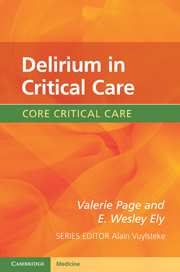Book contents
- Frontmatter
- Contents
- Foreword
- Delirium, a patient testimony
- 1 What is delirium in critical care?
- 2 How common is delirium in critical care?
- 3 What does delirium look like in critical care?
- 4 Delirium in critical care: how does it happen?
- 5 Delirium: what causes it? Risk factors
- 6 Delirium in critical care: why is it important?
- 7 Delirium in critical care: how do we diagnose it?
- 8 How to prevent delirium?
- 9 Treatment of delirium in critical care
- 10 Mental capacity and restraints
- 11 End-of-life care
- 12 What is the future?
- Selected references
- Index
- References
12 - What is the future?
Published online by Cambridge University Press: 05 December 2011
- Frontmatter
- Contents
- Foreword
- Delirium, a patient testimony
- 1 What is delirium in critical care?
- 2 How common is delirium in critical care?
- 3 What does delirium look like in critical care?
- 4 Delirium in critical care: how does it happen?
- 5 Delirium: what causes it? Risk factors
- 6 Delirium in critical care: why is it important?
- 7 Delirium in critical care: how do we diagnose it?
- 8 How to prevent delirium?
- 9 Treatment of delirium in critical care
- 10 Mental capacity and restraints
- 11 End-of-life care
- 12 What is the future?
- Selected references
- Index
- References
Summary
The facts
As discussed in Chapter 1, Engel and Romano bemoaned in 1959 that the clinician fails to recognize delirium and is more concerned to ‘protect the functional integrity of the heart, liver and kidneys of his patient but has not learnt to have similar regard for the functional integrity of the brain’.
What we do know
Delirium in ICU is a condition that develops overall in approximately one in three patients; and in two of three patients needing mechanical ventilation.
ICU delirium is frequently missed and its duration is linked to an increasing risk of mortality. It is associated with significantly worse outcomes including long-term cognitive impairment.
Some cases are preventable.
What we don't know
Many things… we have more questions than answers and probably will have for some time to come. Some questions are listed in Table 12.1.
Education
Screening for delirium should be a routine fact of ICU life, such as measuring urine output! The brain is the most important organ in the body. It is the one organ everyone wants intact on discharge. Education is required to ensure this happens, and education takes time.
The fact that this has not been taken into account before does not make it unimportant now. Consider how important the immune system is in sepsis and that the intact brain modulates the immune system. As we learn more we'll put more pieces together – this is the beginning.
- Type
- Chapter
- Information
- Delirium in Critical Care , pp. 202 - 207Publisher: Cambridge University PressPrint publication year: 2011

